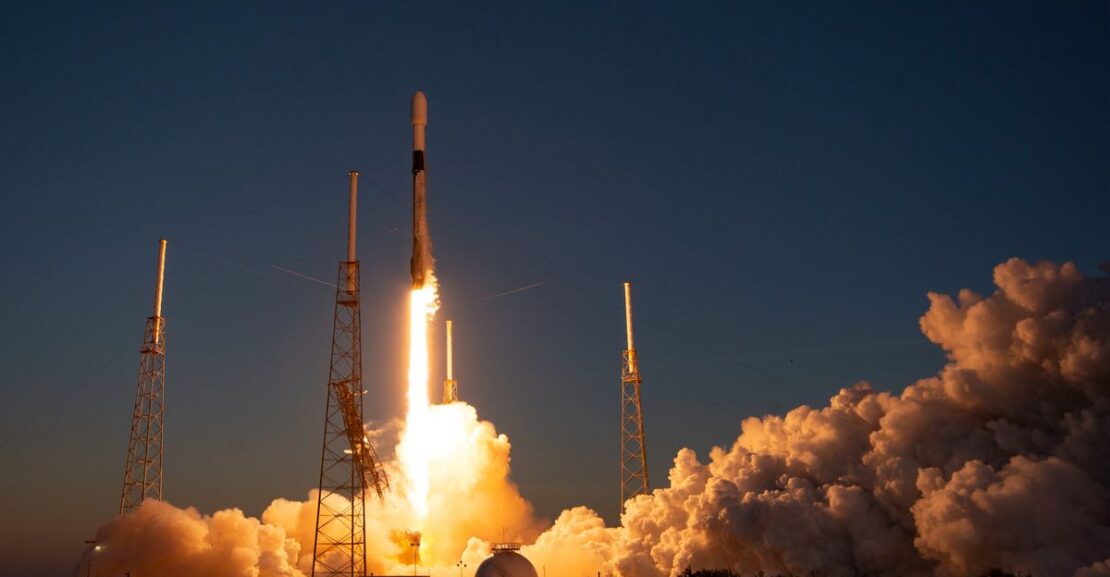(Image credit: SpaceX)
SpaceX will launch an advanced GPS satellite today (May 30) on record-breaking short notice, and you can watch the action live.
A Falcon 9 rocket is set to lift off from Cape Canaveral Space Force Station in Florida today during a 15-minute window that opens at 1:23 p.m. EDT (1723 GMT), carrying the GPS III SV-08 spacecraft to orbit for the U.S. Space Force.
SpaceX got the official launch order on March 7, meaning all the prep work was completed in less than three months. That’s a new record for U.S. national security missions, which typically take 18 to 24 months to get off the pad, according to Space Force officials.
Today’s launch “highlights another instance of the Space Force’s ability to complete high-priority launches on a rapid timescale, which demonstrates the capability to respond to emergent constellation needs as rapidly as Space Vehicle readiness allows,” Space Force Col. Jim Horne, senior materiel leader of Launch Execution for Assured Access to Space, said in a GPS III SV-08 mission description.
You can watch today’s launch live; SpaceX will webcast it via X, beginning about 15 minutes before liftoff.
As its name suggests, GPS III SV-08 will be the eighth GPS III satellite to reach orbit. (“SV” is short for “Space Vehicle.”) The Space Force plans to loft 10 of these spacecraft, which are built by aerospace giant Lockheed Martin, with the final two going up in the next year or so.
The first GPS III spacecraft launched in 2018. All but one have flown atop Falcon 9s; the lone exception was GPS III SV-02, which rode a United Launch Alliance (ULA) Delta IV rocket to space in August 2019.
ULA was originally supposed to launch GPS III SV-07 and GPS III SV-08 as well, on its new Vulcan Centaur rocket, but the Space Force switched both of those missions to Falcon 9s. (Vulcan Centaur remains the rocket ride for GPS III-09 and GPS III-10.)
GPS III SV-07 launched last December after just five months of processing work, the current record for a national security mission. But the Space Force thought that it, SpaceX and Lockheed Martin could break that mark, which brings us to today’s liftoff.
And we may see another new record before too much longer.
“First and foremost, I think we can go faster than the three months we’re going to prove out on this particular launch, and I think we’ll continue to refine our processes and move forward,” Col. Andrew Menschner, Mission Delta 31 commander at Peterson Space Force Base in Colorado, said on Wednesday (May 28) during a call with reporters that discussed the GPS III SV-08 mission.
GPS III spacecraft are quite advanced compared to their predecessors; the precision, navigation and timing information they provide is up to three times more accurate, according to Space Force officials. And they’re nearly eight times more resistant to jamming — an important feature, given the increasingly contested and competitive nature of the space landscape.
“I think our adversaries that intentionally want to do us harm have been studying the way we do business over the last 20 years,” Menschner said during Wednesday’s call, in response to a question from Space.com.
“They’ve certainly seen the dependence of the U.S. Joint Force on space capabilities, and, in particular, on positioning, navigation and timing that comes from the GPS constellation,” he added. “So, I think our adversaries are intentionally designing their approaches to try and take away some of that advantage, and that includes jamming and interference with GPS signals.”
The GPS III SV-08 satellite is named after pioneering NASA mathematician Katherine Johnson, one of the “hidden figures” who helped the United States get its human spaceflight program off the ground in the early days of the space race.
Other spacecraft in the GPS III series have also honored NASA luminaries; GPS III SV-05 and GPS III SV-07 were named after Neil Armstrong and Sally Ride, respectively.
The GPS constellation currently consists of 31 active satellites, with seven others serving as on-orbit spares.
Join our Space Forums to keep talking space on the latest missions, night sky and more! And if you have a news tip, correction or comment, let us know at: [email protected].

